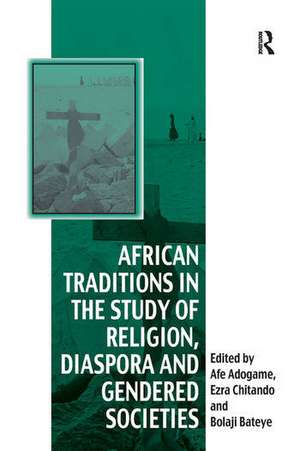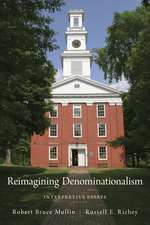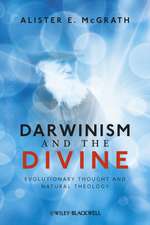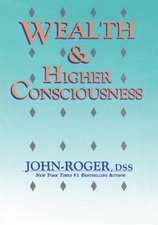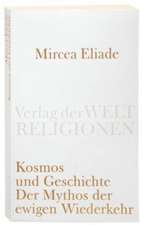African Traditions in the Study of Religion, Diaspora and Gendered Societies: Vitality of Indigenous Religions
Autor Ezra Chitando Editat de Afe Adogameen Limba Engleză Paperback – 27 feb 2017
| Toate formatele și edițiile | Preț | Express |
|---|---|---|
| Paperback (1) | 469.34 lei 43-57 zile | |
| Taylor & Francis – 27 feb 2017 | 469.34 lei 43-57 zile | |
| Hardback (1) | 1054.71 lei 43-57 zile | |
| Taylor & Francis – 15 feb 2013 | 1054.71 lei 43-57 zile |
Din seria Vitality of Indigenous Religions
-
 Preț: 565.95 lei
Preț: 565.95 lei -
 Preț: 469.34 lei
Preț: 469.34 lei -
 Preț: 389.66 lei
Preț: 389.66 lei -
 Preț: 383.33 lei
Preț: 383.33 lei -
 Preț: 435.21 lei
Preț: 435.21 lei -
 Preț: 489.10 lei
Preț: 489.10 lei -
 Preț: 466.88 lei
Preț: 466.88 lei -
 Preț: 386.18 lei
Preț: 386.18 lei -
 Preț: 383.30 lei
Preț: 383.30 lei -
 Preț: 489.26 lei
Preț: 489.26 lei - 16%
 Preț: 338.33 lei
Preț: 338.33 lei -
 Preț: 380.78 lei
Preț: 380.78 lei -
 Preț: 416.22 lei
Preț: 416.22 lei - 18%
 Preț: 1109.18 lei
Preț: 1109.18 lei - 17%
 Preț: 257.25 lei
Preț: 257.25 lei -
 Preț: 379.86 lei
Preț: 379.86 lei -
 Preț: 489.26 lei
Preț: 489.26 lei -
 Preț: 394.19 lei
Preț: 394.19 lei -
 Preț: 489.26 lei
Preț: 489.26 lei - 17%
 Preț: 259.92 lei
Preț: 259.92 lei - 18%
 Preț: 1000.27 lei
Preț: 1000.27 lei -
 Preț: 449.41 lei
Preț: 449.41 lei - 18%
 Preț: 1000.27 lei
Preț: 1000.27 lei -
 Preț: 449.41 lei
Preț: 449.41 lei -
 Preț: 323.23 lei
Preț: 323.23 lei - 18%
 Preț: 1054.71 lei
Preț: 1054.71 lei - 18%
 Preț: 1109.18 lei
Preț: 1109.18 lei
Preț: 469.34 lei
Nou
Puncte Express: 704
Preț estimativ în valută:
89.81€ • 94.02$ • 74.31£
89.81€ • 94.02$ • 74.31£
Carte tipărită la comandă
Livrare economică 07-21 aprilie
Preluare comenzi: 021 569.72.76
Specificații
ISBN-13: 9781138250697
ISBN-10: 1138250694
Pagini: 208
Dimensiuni: 156 x 234 x 11 mm
Greutate: 0.45 kg
Ediția:1
Editura: Taylor & Francis
Colecția Routledge
Seria Vitality of Indigenous Religions
Locul publicării:Oxford, United Kingdom
ISBN-10: 1138250694
Pagini: 208
Dimensiuni: 156 x 234 x 11 mm
Greutate: 0.45 kg
Ediția:1
Editura: Taylor & Francis
Colecția Routledge
Seria Vitality of Indigenous Religions
Locul publicării:Oxford, United Kingdom
Cuprins
Contents: Preface, Ulrich Berner; Introduction: African traditions in the study of religion in Africa: contending with gender, the vitality of indigenous religions and diaspora, Ezra Chitando, Afe Adogame and Bolaji Bateye; Part I Religion and Society, Religion in Society: Approaches to peacemaking in Africa: Obuntu perspectives from Western Kenya, Lucas Nandih Shamala; Religious pluralism and secularization in the Nigerian religious sphere, Danoye Oguntola Laguda; Faith, spiritualism and materialism: understanding the interfaces of religion and the economy in Nigeria, Olutayo Adesina; Towards a civil religion in Nigeria, Musa Barnabas Gaiya; The implications of ancestral veneration manifesting in national symbols for national integration and moral transformation in Nigeria, Jacob Kehinde Ayantayo; The concept of expiatory sacrifice in the early Church and in African indigenous religious traditions, Samson Adetunji Fatokun. Part II Diaspora, Youth and Gender Dynamics: Researching African immigrant religions: boundaries, belonging and access, Abel Ugba; Ãìnà obìnrin kò seé dáké lásán, bà a dáké lásán, enu nÃà yo ni: women’s leadership roles in AládÅrà churches in Nigeria and the USA, Mojúbà olú Olúfúnké Okome and Elisha P. Renne; The place of second-generation youth in West Indian Pentecostalism in the diaspora - New York and London, Janice McLean; Religion and masculinities in Africa: an opportunity for Africanization, Ezra Chitando; Rethinking women, nature and ritual purity in Yoruba religious traditions, Bolaji Bateye; The impact of Christian women's organizations on Nigerian society, Dorcas Olu Akintunde; The Northern Nigerian Muslim woman: between economic crisis and religious puritanism, Oluwakemi Abiodun Adesina; Index.
Notă biografică
Dr Afe Adogame teaches Religious Studies and World Christianity at the University of Edinburgh, UK. He is the General Secretary of the African Association for the Study of Religion (AASR). He is the author of Celestial Church of Christ: The Politics of Cultural Identity in a West African Prophetic-Charismatic Movement (1999); and co-edited European Traditions in the Study of Religion in Africa (2004); Religion in the Context of African Migration (2005); Unpacking the New: Critical Perspectives on Cultural Syncretization in Africa and Beyond (2008) and Christianity in Africa and the African Diaspora: The Appropriation of a Scattered Heritage (2008). Dr. Ezra Chitando teaches History and Phenomenology of Religion at the University of Zimbabwe. He also serves as a Consultant on HIV and AIDS for the World Council of Churches (WCC). He is the author of Singing Culture: A Study of Gospel Music in Zimbabwe (2002); Living with Hope: African Churches and HIV/AIDS. Vol. 1 (2007); Acting in Hope: African Churches and HIV/AIDS, Vol. 2 (2007) and Troubled but not Destroyed: African Theology and HIV (2009). Dr. Bolaji Bateye teaches Religious Studies and Gender Studies at Obafemi Awolowo University and she is a Resource Person at the OAU Centre for Gender and Social Policy Studies. Dr Bateye was a Leventis Scholar at the Centre for African Studies, SOAS, London in 2006. A budding scholar, widely published in books and journals including: 'Forging Identities: Women as Participants and Leaders in the Church among the Yoruba", in Studies in World Christianity (2007); 'Paradigmatic Shift: Reconstruction of Female Leadership Roles in New Generation Churches in South-western Nigeria' in Afe Adogame, et al. (eds.), Christianity in Africa and the African Diaspora: The Appropriation of a Shattered Heritage (2008).
Recenzii
’By focusing on the role of religion in African societies, African religious expressions in diaspora and the role of African women in the academy, the contributors to this book challenge what the editors portray as a field traditionally dominated by men, many of whom are non-African.This volume offers a methodological challenge to the wider field of Religious Studies and at the same time exemplifies the Africanisation of the study of African religions.’ James L. Cox, University of Edinburgh, UK 'As a multidisciplinary project it succeeds beautifully, with scholarly expertise ranging from sociology to history, theology to anthropology, and gender studies to political science. Yet even with this wide scope, the editors have managed to achieve synergy throughout.' Journal of Religion in Africa
Descriere
This book presents a unique multidisciplinary exploration of African traditions in the study of religion, diaspora and gendered societies. Contributors drawn from diverse African and global contexts situate current scholarly traditions of the study of African religions within the purview of academic encounter and exchanges with non-African scholars and non-African contexts.
